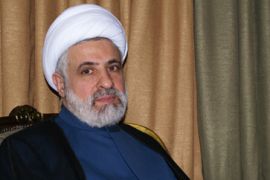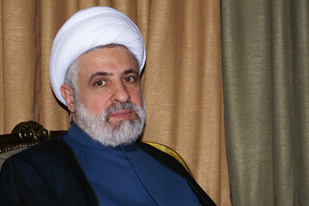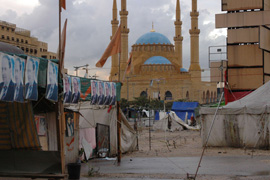Interview: Naim Qassem
Al Jazeera speaks exclusively to Hezbollah’s deputy secretary-general.

 |
| Qassem: The path of the authority has led Lebanon to a crisis |
On the eve of a deadline to agree a new president to succeed Emile Lahoud Lebanon’s politicians are still deeply divided.
Al Jazeera travelled to a secret location in Beirut to speak to Naim Qassem, Hezbollah’s deputy secretary-general and the number two to Hassan Nasrallah.
AJ: What is the mood in the March 8 camp (the opposition bloc which Hezbollah leads), a day before the deadline to elect a new president for Lebanon?
Qassem: The opposition has persistently been insisting on participation. Partnership is the major thing in order to rescue the country.
On the other hand, the authority group [referring to the majority March 14 movement] insisted on appropriation – taking things for themselves – and ignoring the constitution and also keeping out of power a whole sect, the Shia sect.
You have seen that the path of the authority has led us to a crisis, a huge crisis. We have been suffering for over a year now. Accord [between all parties] is required and is the solution. We are ready for that.
We have already declared that we have retreated from our demand of having a national unity government, but only on the basis that the president is elected in harmony and in line with constitutional demands. The constitution requires that two-thirds of the MPs [support a candidate]. This protects concord.
| Special report |
So here we are not behaving in a way that one party is giving the other something. Rather, we are in harmony with the natural rights given by the constitution to achieve consensus.
March 14 could argue that because March 8 is insistent on a compromise president, they are having the right to choose their preferred candidate taken away.
They can’t get the candidate they want. The constitution does not allow this, because they need a two-thirds quorum. Therefore, we are partners. We have to find something in common between the two partners.
They [March 14] are thinking in a wrong manner. They believe that because they are the parliamentary majority they can select the president among themselves. This is wrong. It is true that as a majority they can get the prime minister of their own, but for the president this requires consensus.
If a president comes about through an understanding with the opposition, the understanding will cover the main programme and the main vision of that president. Then the name of that president won’t be a problem.
I can tell you very frankly – the opposition fears the majority’s single-handedness. They worked with this single-handedness for a year and they have destroyed the country.
How confident are you that a consensus candidate will be agreed by the final deadline of November 23?
I don’t expect an election session to take place tomorrow if there is no consensus. For a consensus to happen – within this very short time that is left – this needs a surprise.
 |
| Opposition protesters have camped in downtown Beirut all year |
It also requires courage from the March 14 group to agree on the path of the solution. If they can agree on the path, the name can be resolved within minutes.
If there is not agreement on anything now, it will not change anything in the future. The solution for the future will be the solution that can be achieved right now.
How would March 8 respond if no agreement on a president is reached and the March 14 majority bloc decides to elect a president via a simple majority in its own session?
Election through a simple majority is against the constitution. If they did that, they are taking the country to a problem. The door will be opened to complications, which we do not know.
I think some of those in March 14 have started to believe that to elect through a simple majority is wrong.
How would Hezbollah react if the majority instead decided that Fouad Siniora’s government took over the powers of the president, on a transitional basis?
What is required is that we seek to have a president elected. If the issue is postponed for a few
| Related feature | ||
|
|
days until a situation is reached, no problem.
But for the illegitimate and unconstitutional government of Siniora to take over and exercise the authority of the president – this will cause a quagmire in Lebanon.
If a president is not elected without agreement the country will face a vacuum.
Lebanon’s people remain concerned that if no agreement on a president is reached it could lead to armed conflict. How realistic is that prospect if a deal is not worked out between the majority and the opposition?
It is the right of the people to feel anxiety, and it is natural. Nobody can give guarantees. We need to think of the solution, not the problem. We need to quicken the solution to find a president.
I hold the authority group responsible for the delay in selecting a president. They have been wasting opportunities for a year. I hope they will ponder the situation and not waste this chance.
March 14 says that Hezbollah should disarm, with its arms and fighters transferring to the Lebanese army, while you reject UN Security Council resolution 1559 (which calls for the disarmament of all Lebanese and non-Lebanese armed groups in Lebanon).
To this end, is the election of a new president a key development regarding the future of the Lebanese armed resistance against Israel?
The issue of the continuation of the resistance in Lebanon is affiliated with the political debate concerning the independence of Lebanon.
This issue cannot be tackled with rhetoric and loose declarations – it requires dialogue.
Amidst this current tense situation in Lebanon, this discussion cannot develop in the first place.
| We need to say “stop” to the United States. We must not allow the Americans to create more mess in our internal affairs.” |
Let us finish the formation of the political authority in the country. The state can then discuss the points it wants to negotiate.
As for resolution 1559, in our opinion it does not exist. We are not concerned with it. It talks about militias. We are a resistance. The minute that resolution was passed three years ago, we said it was not valid for Lebanon.
As for resolution 1701, we gave an overall agreement to it and we think we have implemented it.
However, it is Israel that is violating Lebanese airspace and Israel that is occupying the Shebaa Farms [which is part of the Golan Heights region annexed by Israel from Syria].
It is not coming out of al-Ghajar [a village which lies directly on the UN Blue Line dividing Lebanon and the Israeli-occupied Golan Heights], and it is not releasing prisoners. These are all against 1701.
It is natural for us to take an interest in the presidential candidates because his administration will influence the Lebanese dossiers and files.
Therefore we insist that the president has the ability to have consensus among the Lebanese and that he will protect Lebanon’s independence.
The infiltration of the Palestinian refugee camp at Nahr al-Bared by Fatah al-Islam fighters earlier this year, and the army’s operation to wipe them out, was a key development this year in Lebanon. What is Hezbollah doing to help prevent such an incident occurring again?
Those who believe that the solution to solve the situation in the camps is through military force are wrong.
The solution has to be political. We need to understand the demands of the Palestinians. They want to return to their homeland, and they are in Lebanon temporarily.
 |
| Many Lebanese are fearful of any protracted political crisis [AFP] |
They have internal protection for fear of Israeli attacks against them. We have to distinguish between their case and Lebanese internal politics.
Of course, we [Hezbollah] and the Palestinians share a common enemy [Israel]. However, there are particularities.
I underline that the situation be solved politically in future and that it does not become part of Lebanese internal politics.
There are concerns that all the political factions within March 14 and March 8 have set up militia groups in readiness for armed conflict if a political agreement is not reached. There are fears that the conflict could pitch religious sects against each other. Are those concerns justified?
If there is no political solution the tense situation could lead to a crisis, including military frictions. Who can guarantee this? Who knows if there are third parties who are interested in having these conflicts?
The religious confessions are on both sides [March 14 and the rival March 8] and consequently all sorts of potential problems are there.
I reiterate that the solution lies in hastening consensus. We need to say “stop” to the United States. We must not allow the Americans to create more mess in our internal affairs.
Power has to be affiliated to those who have popularity, not to those who exploit the opportunities of others. We need to say stop obstructing the constitution and elect a president of consensus. The solution is clear.

